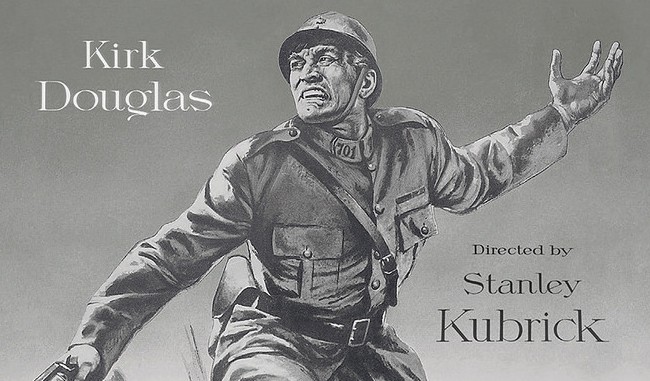
Disc Reviews
Paths of Glory Blu-ray Review

Stanley Kubrick was a game changer as a director. What he did with different genres was to take cinema and the genres he played with took cinema into areas previously untrodden, whether it was science-fiction (2001: A Space Odyssey, 1968), horror (The Shining, 1980), black comedy (Dr. Strangelove, 1963) and the Vietnam War film (Full Metal Jacket, 1987). The latest release by Eureka! in their Masters of Cinema sub-label is Kubrick’s early anti-war film, Paths of Glory made in 1957 it was the fourth film the 30-year-old directed. Paths of Glory has been compared with another classic anti-war film focusing on the First World War, All Quiet on the Western Front(1930), but Kubrick’s film is less about the senseless loss of life in war and instead on the moral judgement of those running it. The film is based on a novel by Humphrey Crabb which had been published back in the 1930s. Because its focus is on the moral turpitude of the French commanders it was banned in France for many years (as well as receiving long term bans in Belgium and Spain too).
The film opens with the arrival of a French General, Broulard (played by veteran actor Adolphe Menjou), who has come to meet with General Mireau (George Macready) and persuades him that the army need to take a stubborn German occupied hill, known as The Ant Hill. General Mireau visits the front and clearly in his walk through the trenches he repeats the same old spiel to each of the troops with no real clear interest in them as individuals. He then visits Colonel Dax (Kirk Douglas), a former lawyer and a well-respected officer among his men. He instructs Dax that he can expect to lose 5% of his men as they head over the top of the trench to the wire, a further 15% at the French wire and so on until he is left with an estimated 20% of men to hold Ant Hill. As dawn breaks the French guns bombard German positions for 15 minutes until the men go over the top. In one of the most brilliantly choreographed battle sequences since All Quiet on the Western Front, the men are mown down and caught in the barbed wire and shell holes, until hardly a soldier can be seen alive. Mireau is watching from his vantage point that one part of the trench men from the 701st Division are still in the trenches. Angered, Mireau orders that the gun batteries fire on their own men. The officer in charge of the battery refuses the order unless he has it in writing, to which Mireau orders that he be arrested for disobeying orders. Dax also makes it back to the trenches and angrily rebukes the alcoholic officer in charge (who had already threatened a corporal when he had accused the officer for dereliction of duty and responsible for the death of another soldier in a reconnaissance mission).
The next morning Dax is recalled to army headquarters back at the chateau where Mireau orders for a whole group of men to be rounded up for cowardice. Dax manages to get this down to a randomly selected three soldiers who go on trial for desertion and face execution by firing squad. Dax, an experienced lawyer, finds he is up against a kangaroo court.
From the offset Paths of Glory was going to struggle as a money earner as far as the producers were concerned. However, Kirk Douglas saw something talented and original in Kubrick (Douglas was also an uncredited producer); Douglas said and would go on to state that he always believed that the film would grow into a classic and would be remembered and would gain recognition in time – and he wasn’t wrong on that count. The film cost $900,000 to make, with a 1/3 of that going to Douglas as his fee. Fresh from his classic role as Vincent Van Gogh in Lust for Life (1956), Douglas once again shows that he is an actor of great quality; nowhere better highlighted than in his frustration in the court scene. This scene, as was much of the film was shot entirely in Bavaria in and around Schloss Schleissheim, just outside of Munich. The Baroque grandeur of the palace highlights the equally Baroque manner of the Generals that contrasts so strongly with life in the trenches. The support cast also do an amazing job. One of the actors was problematic though. Timothy Carey plays the simple Private Ferol who stands trial as one of the ‘cowards’. He frustrated Kubrick and Douglas and was eventually fired for his attitude. He plays this well (over played it according to Douglas) in the courtroom scene but in many scenes in the film it is a body double. The scale of the film is large but Kubrick is also able to maintain the action. And for this reason when Anthony Mann was fired by Douglas on the set of Spartacus (1960), the Kirk suggested Kubrick as the replacement director establishing his place in the history books. The print looks great with the right amount of grain but sadly the disc is bereft of the usual collection of extras with a couple of extras including a video interview with Richard Ayoade and a complete booklet with essays. A great addition to anyone’s collection.
Chris Hick




